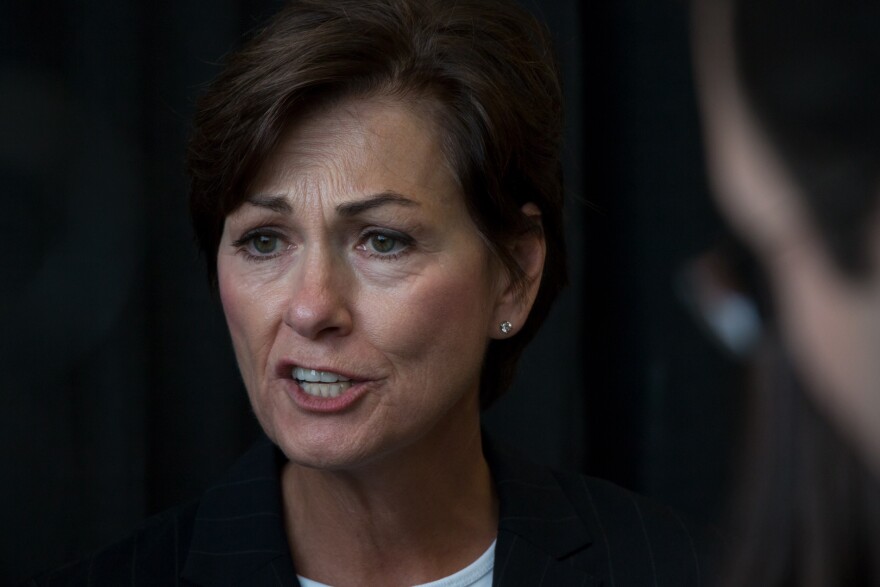Gov. Kim Reynolds has agreed to keep resettling refugees in the state, while also questioning the security record of the program, without evidence. Under a Trump administration executive order, states and counties have to give formal consent for the federal government to resettle refugees in their area, a move that some supporters say gives local officials a greater say in the process.
Refugee advocates are thanking Reynolds and some county officials for signing on to letters to the federal government, formally consenting to continued refugee resettlement in their area.
The move is in response to an executive order issued on September 26th, which changes past policy to put the onus on both state and county officials to actively agree to refugee resettlement in their communities.
Advocates worry that if county and state officials didn’t sign off on the practice, refugees would receive less support with housing, job placement and language and cultural training. Without those support services, some advocates were concerned refugees would leave their communities.
"If [refugees] were to leave, it would be catastrophic for our town...They're doing everything in their power to be a good, great citizen. And they're just contributing in many, many ways." - Maria Gomez, Columbus Junction School Board Member
“If they were to leave, it would be catastrophic for our town,” said Maria Gomez, the vice president of the Columbus Junction School Board in Louisa County.
Gomez says there are hundreds of refugees in her community of about 1,900, who have helped start businesses and a church, and who she says work hard and pay their taxes. She says she cannot imagine her community without them.
“I don’t what it would be for our school district if those kids were no longer here,” Gomez said. “They’re doing everything in their power to be a good, great citizen. And they’re just contributing in many, many ways.”
Iowa advocates say the executive order would not bar refugees from certain parts of the country as some initially feared it might. They say refugees would still have freedom of movement in the country and would still be able to move to communities that didn’t formally consent to the refugee resettlement program, but they would not be able to access the federal government’s support services in those places.
In a letter co-signed with the governors of Nebraska and South Dakota, Reynolds praised the Trump administration policy that gives local governments more latitude in withholding support from refugees, and suggested Americans have lost confidence in the program’s lengthy vetting process.
Refugees face more exhaustive screenings than many other immigrants, a process than can take two years and includes multiple background checks, biometric testing and fingerprinting, as well as in-person interviews with federal officers, before a refugee is settled in the United States.
“Thanks to your leadership, Americans can be confident once again in the screening process for
Reynolds’ office did not reply to requests for evidence of mismanagement by or formal complaints against the refugee resettlement program.
Lemi Tilahun works with refugees in Cedar Rapids and says there are situations where local officials would like to have a greater say in how refugee resettlement is administered, but he said he knew of no accounts of mismanagement or a failure of the vetting process. He says the governors’ language in their letter runs the risk of casting fear and doubt on the process.
“[The governors’ letter is] casting this doubt or this fear that we don’t know about the vetting process. I think the danger that we run into, that it could isolate or alienate folks that are new to the community because of the perception that’s out there. And it really goes to feed the wrong perception,” Tilahun said.
"[The governors' letter is] casting this doubt or this fear that we don't know about the vetting process. I think the danger that we run into, that it could isolate or alienate folks that are new to the community because of the perception that's out there. And it really goes to feed the wrong perception." - Lemi Tilahun, refugee advocate in Cedar Rapids
Besides the executive order, the Trump administration has taken steps to drastically cut what’s referred to as the refugee cap: the number of people admitted to the country each year. That cap is now set at 18,000 for next year, the lowest level in the history of the modern refugee program, and down from 110,000, the level set during the last year of the Obama administration.
Earlier this year, CNN reported the country admitted no new refugees in the month of October. Quartz reported it was the first month on record that the U.S. had resettled no new refugees.
This, at a time when the United Nations calculates there are more displaced people globally than at any time in modern history, including in the wake of World War II.
Tilahun, like other refugee advocates, points out that refugees can help revitalize communities in Iowa that have struggled to hold on to their native-born population, and are a boon to employers desperate for workers at a time when Iowa’s unemployment rate is among the lowest in the country and many jobs go unfilled.
“The receiving communities…they’re gaining productive people that are readily and available to be able to utilize their wealth of experience. And on the other side, we’re also helping vulnerable populations,” he said.
Tilahun says if Iowans knew more about the plight of refugees, about the violence and deprivation they were fleeing, and the years or decades they may have spent stranded in refugee camps, they would be more open to welcoming them into the state.
Many Iowans do pride themselves on a legacy of being welcoming to refugees, dating back to the leadership of then-Gov. Robert Ray in welcoming Tai-Dam people fleeing Vietnam in the 1970s. Ray’s actions helped make Iowa a national leader in resettlement, at a time when Congress had not yet established the federal refugee resettlement program.
Kerri True-Funk with the Des Moines field office of the U.S. Committee on Refugees and Immigrants says the state still has a reputation for being welcoming, but she says there is always more work to be done.
“The ideals and beliefs that Iowa is a welcoming place for refugees is still there, but that’s being hindered by federal level policies,” she said. “I would like to see some of the leadership on the federal level continue to make the whole country a welcoming place.”
So far, in addition to the state-level authorization, the boards of supervisors in Dallas, Johnson, Linn, Louisa and Polk counties have signed formal letters of consent for refugee resettlement. Advocates say those counties account for many of the major resettlement areas in the state, but they’re planning to lobby more counties as well.
Sara Zejnic works with refugees at the Catherine McAuley Center in Cedar Rapids. She says the restrictions put in place by the Trump administration have posed a barrier, but are also an opportunity to educate more people about refugees and their experiences.
“One of the unintended consequences is we’ve, in the resettlement world, have seen an outpouring of love and support,” she said. “Having refugee resettlement in the news more has kind of opened more peoples’ eyes to communities or people living within their communities that they may not have realized were there.”




